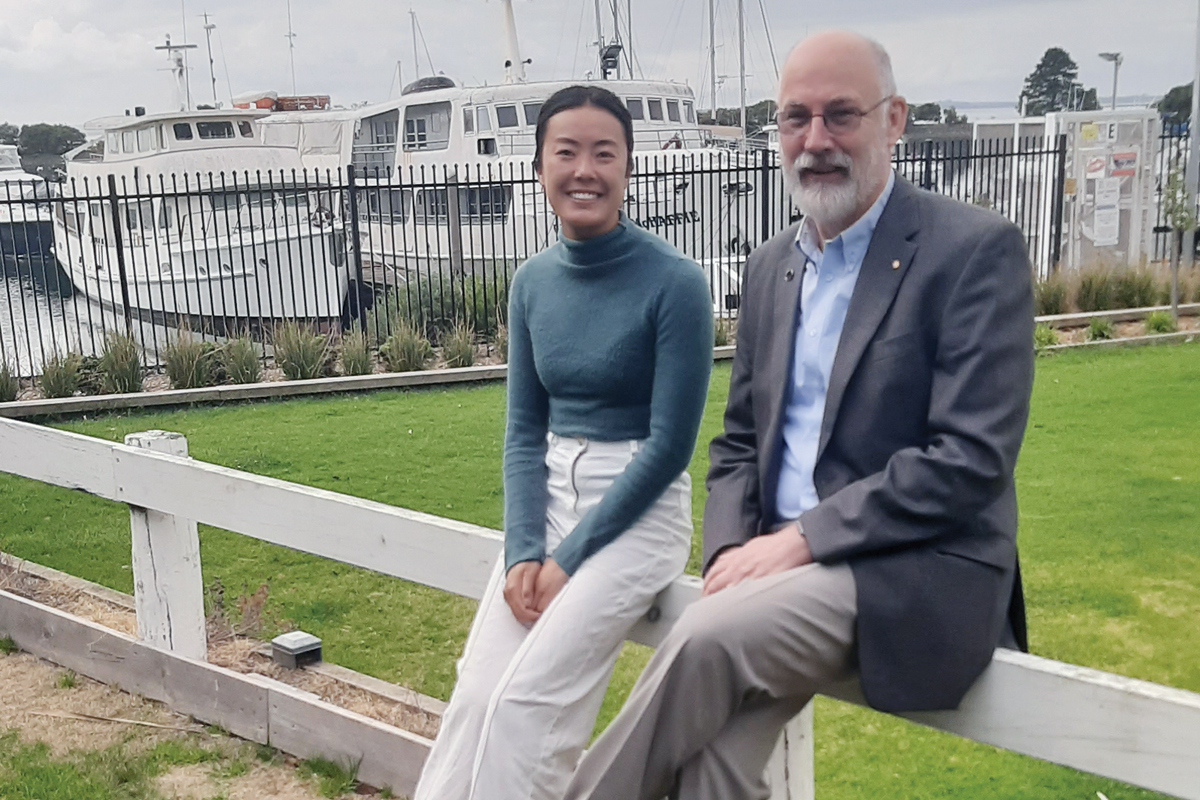THE team at the Dolphin Research Institute has a lot to celebrate, with the beginning of its research “fellow” program, measurable success of its programs to protect and monitor dolphins, and the continued expansions of its ambassador program with schools.
The institute was formed in 1991, with a focus on research on dolphins and whales, conservation in education, environmental leadership for the community, and being a strong and sustainable organisation.
A registered charity, it is self-financed from the community, foundations, the corporate sector and government grants, and is about to release its Impact report, documenting key data it has collected.
CEO Jeff Weir OAM said the growth of the organisation and its valuable research garnered from surveys, observations, photographs and non-invasive tracking and monitoring provided credible science and data that is used to help make decisions about protecting dolphin (and whale) populations in Port Phillip and Western Port.
He said that data had monitored three generations of dolphins in one area of the bay since 2005 and had added credibility to its voice as an advocate.
“We’ve been able to identify families, who the offspring are and monitor health and behaviour,” he said.
“It’s all important in understanding what’s generally happening in the bay.”
Weir said the DRI’s original concerns and passions about protecting dolphin populations remained, but the organisation had now spread its work further through strong community involvement with citizen science projects and education programs, including the award-winning i sea, i care ambassador program in primary schools.

Weir said including students as ambassadors to help spread messages in schools and the community ensured the next generation was engaged and well informed.
There are now around 500 students across the state registered as ambassadors, and the curriculum-based program has involved about 8000 students.
“The schools choose the students, but they have to apply because it’s such a popular experience for the kids, particularly when we look at their peer teaching,” Weir said.
Our Lady of Fatima Rosebud Primary School visual art teacher Amanda Heggen said the DRI did a great job supporting schools in educating the next generation to appreciate the natural environment.
She said the primary school’s four ambassadors were excited to recently go on the DRI’s trip aboard the boat Moonraker to learn more about Port Phillip and its dolphin, seal and weedy seadragon residents.
“The school has adopted Violet the DRI dolphin to help keep our local dolphins monitored and safe, after many of our students were upset to learn that, over the holidays, the dolphins were harassed by jet skis or not treated respectfully by boat owners and swimmers,” Heggen said.
The students’ decision to redo the Dolphin Distancing information poster to better engage young people became even more relevant when, on their excursion, they saw a boat cross the wake of the Moonraker and cause a frolicking dolphin to dive to safety.
Weir said getting schools involved was helping to spread the message and focus on behaviour change and better outcomes.
He said students had helped tone down and clarify the message of the poster to better reach the audience.
Rather than confrontational signs or demands for more policing, the institute’s new poster was more positive and, instead of blaming and pointing fingers, encouraged shifts in behaviour.
The campaign has been described as Neighbourhood Watch for dolphins and whales by encouraging people to engage with other water user about the need to not approach dolphins closer than 100 metres (boats including paddled craft), 300 metres (jet skis) or 30 metres (swimmers).
Stickers are provided to watercraft users to display on vessels, reinforcing their pledge to distance and educating others.
“That is a world-first for behaviour-change around dolphins and is known to have worked in other situations,” Weir said.
The institute – which has a core personnel of five – works closely with other organisations on caring for the environment and raising awareness of the importance of healthy ecosystems, including catchment management authorities, litter and other community groups and industry.
The DRI has received awards, including the Banksia Environment Foundation’s national award in the Marine and Coastal Water category in 1997, the Victorian Coastal Awards of Excellence Species Protection category in 2002 and the Community Partnerships category in 2013, an Acknowledgment of Excellence Award from the Mornington Peninsula Shire in 2018 and the 2020 Victorian Environmental Education.
Weir said ongoing engagement with young people through the program came from understanding behaviour change and the institute’s aim to “do better” on motivating young people to take charge and consistently educate their fellow students.
“We have a long way to go in getting the message out in communities about the importance of our local environment and waterways, with our social research telling us that 90 per cent of Victorians think the most important marine environment to protect is in Queensland,” he said.
“So, we have to shift that, especially with Western Port with all its mangroves, but which is the very poor cousin of Port Phillip.”
Weir said a sign of the institute’s success was an increase in dolphin populations.
“Our current data shows us that common dolphin numbers in Port Phillip are at least 108, up from just a handful when we started,” he said.
Weir said keeping waterways healthy by reducing nitrogen levels, reducing sediments and raising awareness required a joint effort with several organisations.
The institute is always looking to the future, and Weir said he hoped the new research fellow program would continue and grow. Its goal was to double the number of research fellows from two to four by 2026.
“Without data and credible research we would have little influence, so this program is extremely important,” he said.
First published in the Southern Peninsula News – 11 April 2023